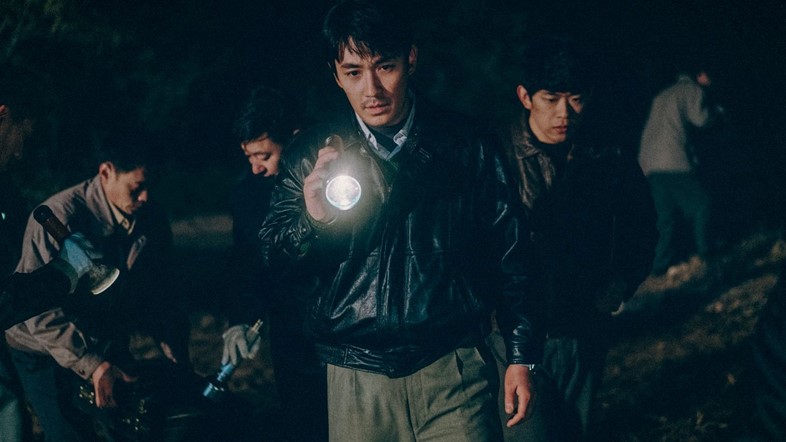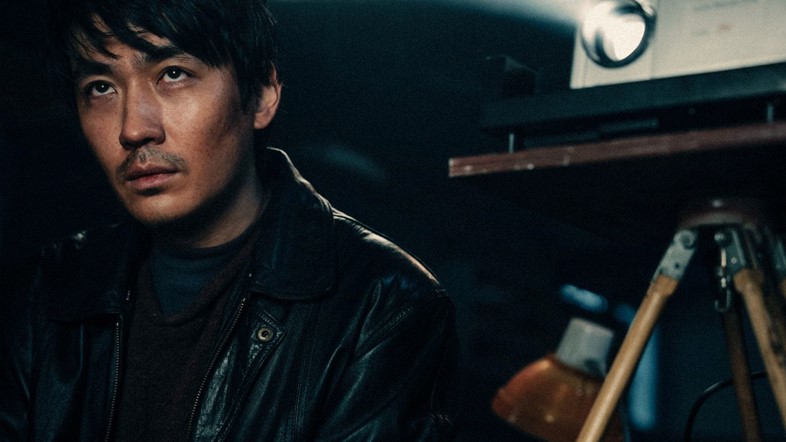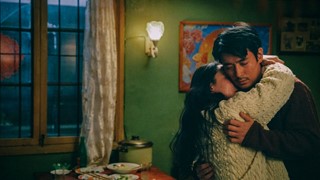For director Wei Shujun, the reaction to his enigmatic crime thriller “reveals something very interesting about the human mind”
In most crime dramas, mysteries are there to be solved. That’s why, for years on the telly come Sunday evening, you couldn’t move for the body bags: after all, what better way to push back the dawning horror of a new working week than a nice bit of murder to be tidily explained and filed away, like a completed jigsaw puzzle?
There’s another kind of detective story, though, where mystery is a fact of life as inevitable as death and taxes. Zodiac, Cure, Decision to Leave, Memories of Murder: all are high-functioning crime procedurals that frame their riddles in more or less existential terms – and Only the River Flows, a haunting, noir-toned thriller from Chinese director Wei Shujun, is one such story.
Except … is it really? “For me it’s very clear that [redacted] is the murderer,” says Wei, whose film proved an arthouse hit in China last autumn, sparking a frenzy of fan speculation online as to the killer’s identity. “But we refuse to believe it because we can’t see the reason behind it. It reveals something very interesting about the human mind because we know full well the answer, but we still don’t want it to be [true].”
Wei’s drama unfolds in mid-90s China, in the rural backwaters of Jiangdong province. When a series of murders takes place by the river, Inspector Ma Zhe (Zhu Yilong) leads an investigation that presents him with a suspect almost from the outset. An arrest is made, but Ma Zhe isn’t satisfied, obsessively pursuing the case as he uncovers secrets in the townsfolks’ lives that speak to some unnamed shadow in his own being. Meanwhile at home, he and his wife, Bai Jie (Chloe Mayaan), receive difficult news about the birth of their first child – who may also be their last, given China’s one-child policy of the time.
The story is adapted from a novel by Yu Hua, an avant-gardist whose work turns genre convention on its head, and Wei attempts a similar trick here by folding meta layers into the action that blur the lines between dreams, cinema and memory. (The team investigating the case set up shop in a recently abandoned cinema, and Ma Zhe’s dreams make frequent disturbing reference to the tricks the medium can play on your brain.)

One point of difference to the book is its setting in mid-90s China (Yu’s novel was published in 1987). Wei says the decision was in part motivated by plot, the director feeling that a contemporary take on the material would make “the work of detection too easy”. But the moody period setting is another clue that Wei’s ambitions lay in more than unmasking his story’s killer. This was a time of massive social upheaval in the People’s Republic, as rural flight to the cities boomed with the rise of private industry. “Should there be another message [to the film],” says Wei, “it would be the relationship between individuals and the relationship between the individual and society. You can see in the film everyone does everything together – they play together, eat together, work together, and so on and so forth. Nowadays, we are more like individual islands. Each of us is an island.”
But if Wei’s film is a lament for a lost era of collectivist ideals, it’s a complicated one. Without giving away too much, one common thread linking the characters Ma Zhe encounters seems to be a kind of thwarted individualism that’s in conflict with the dour landscape Wei shows us. This is a community with a hole where its heart should be, a fact foreshadowed in a striking opening scene where a boy chases his friends round an abandoned tower block, only to open a door that gives way to a building site below. “It’s like an allegory for what people feel,” says Wei, “The boy is trying find his friends and in the end there’s no one there – not only that, there’s not even a building. It’s the same for [Ma Zhe], he opens one door after another and still he can’t find the answer.”

Which brings us full circle to Ma Zhe, who finally finds himself so beaten down by the case he is no longer able to distinguish what’s real. What’s at the root of this dangerous obsession? “It’s because he sees something he doesn’t understand,” says Wei, returning once more to our deep-seated need to read patterns into chaos. “And if you don’t understand, you are more obsessed with getting to the bottom of it. It’s the same for the audience. People have written entire essays explaining why this or that person is the killer – there was actually a day [in China] when half of TikTok users were discussing [the killer’s identity]. People can’t get their head around it; it’s like if they can’t use their past experience as a tool to support or explain [their theories] then they can’t have peace.”
Only the River Flows certainly has the power of nightmares on its side. It’s a film whose mysteries cling like damp clothes to the skin, right down to a fabulous last shot that provides just a ripple of uncertainty amid a moment of familial bliss. In one comic scene from the film, an irritated Ma Zhe pulls pieces from his wife’s unfinished jigsaw puzzle and flushes them down the toilet. Later, he stares incredulously at the completed puzzle, now framed on the wall. Is she taunting him? And how did she succeed in solving the mystery where he had failed? As with Wei’s dazzling film, it’s just a question of how you look.
Only the River Flows is out in UK cinemas now.
